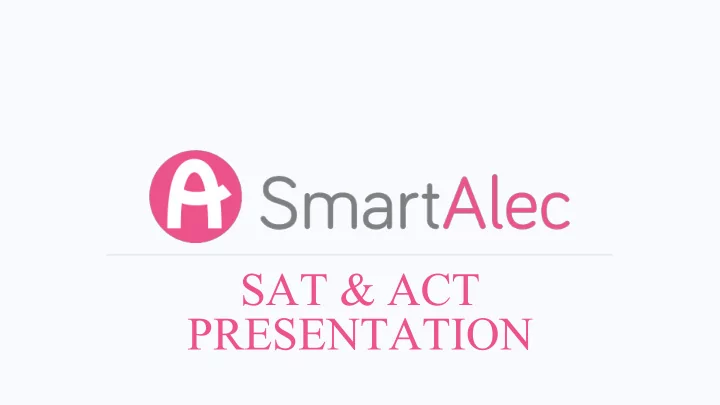

SAT & ACT PRESENTATION
TEST PREP: A TIMELINE
TEST PREP: A TIMELINE Freshman Year Sophomore Year Junior Year Senior Year What should your student be focusing on each year of high school to best prepare them for the test prep (and college application) process?
TEST PREP: A TIMELINE Freshman Year Sophomore Year Junior Year Senior Year ‣ Starting high school off strong ‣ Success matters; a strong first year can help set your student up for a successful high school experience ‣ Learning the fundamentals to succeed on the ACT or SAT ‣ Placing them into higher classes and positioning them for future APs ‣ Giving them the confidence to achieve great grades and scores for the rest of high school
TEST PREP: A TIMELINE Sophomore Year Freshman Year Junior Year Senior Year ‣ Keep your grades up ‣ Think about SAT Subject Tests and if any classes you’re taking can translate well to a test ‣ End of Sophomore Year ‣ Figure out which test best suits your child’s needs ‣ Use a diagnostic test to understand your student’s strengths and how each test will best position the student for success
TEST PREP: A TIMELINE Junior Year Freshman Year Sophomore Year Senior Year ‣ Go in with a test prep strategy in place ‣ Suggested time table (may vary based on an individual student’s needs) ‣ We recommend 10 weeks of preparation (including 10 practice exams) before sitting for an exam ‣ Take the exam for the first time in December ‣ Aim to have the March exam date as their final time taking the exam (NOTE: this will not be possible for all students, but it’s a good goal) ‣ May to focus on AP exams, and June to focus on SAT Subject Tests
TEST PREP: A TIMELINE Senior Year Freshman Year Sophomore Year Junior Year ‣ If you need to take an exam again in senior year, try to get it done before the start of the school year (the August test) ‣ If you need to take any more SAT Subject Tests, try to get them done early ‣ Focus on your college applications, and craft the best application you can!
ACT VS. SAT
ACT VS. SAT What are the differences between the two exams, and how do you decide which test to focus on ?
ACT VS. SAT ACT SAT Number of Questions 215 154 Time Per Question 49 sec 1 min, 10 sec Total Exam Time 3 hrs, 35 min 3 hrs, 50 min Scoring 1 – 36 400 – 1600
ACT VS. SAT ACT ‣ It’s more demanding in terms of speed (students need to answer more questions in a shorter time) ‣ “More learnable” exam ‣ There is typically more room for students to improve (especially those who have test anxiety) SAT ‣ Better for students who like to have more time for complex problems ‣ Good for students who excel on puzzles and riddles ‣ Easier to plan for the essay
ACT VS. SAT ‣ How do you determine which test to focus on? ‣ At the end of sophomore year, we suggest taking a diagnostic to see where your student performs well and which exam they should focus on ‣ Option 1: Take a full SAT and a full ACT and then talk to an expert who can help you analyze the results ‣ Option 2: Shortened SAT and ACT exams with some examples of types of problems you may encounter on each exam ‣ Option 3: Test-taking quiz ‣ Smart Alec offers Option 1 and Option 3 with personalized consultations
TEST PREP OPTIONS
TEST PREP OPTIONS How do you know which prep option is right for your student?
TEST PREP OPTIONS Consider the following questions as we discuss some different options available: ‣ What is the most effective learning environment for your student? ‣ How flexible do you need your prep schedule to be? ‣ What is your family’s budget?
TEST PREP OPTIONS ‣ Self-Guided Prep (Khan Academy, Magoosh, Prep Books) ‣ Pros: ‣ Can be effective for students who are organized and self-motivated ‣ Good for students who can stick to a test-prep schedule on their own (without a weekly scheduled event) ‣ Cons: ‣ Your student will need to identify their own test prep weaknesses ‣ May not have access to all of the best techniques and resources available ‣ Often no set schedule that will keep a student on track ‣ Cost: ‣ $0 - $150 (for prep books and any online courses)
TEST PREP OPTIONS ‣ Class Prep (Princeton Review, Kaplan, Huntington Learning Center) ‣ Pros: ‣ Can be a good way to learn exam strategies and have specific questions answered ‣ Lays out a specific schedule of classes to keep a student on track and give them a prep plan ‣ Cons: ‣ Not personalized to a student’s needs, with tutors typically sticking to a set course rather than customizing classes to the needs of the students in the class ‣ Student will not get much individual attention as there can be more than 12 students in a class ‣ You often don’t know who your instructor will be ‣ Cost: ‣ $849 – $1200 (for course packages)
TEST PREP OPTIONS ‣ One-on-One (Smart Alec, Tutor Associates, Ivy Global) ‣ Pros: ‣ Prep specifically tailored to an individual student’s strengths and weaknesses ‣ Create a flexible preparation plan according to a student’s specific schedule ‣ Cons: ‣ Can be expensive (depending on the company/tutor) ‣ Some companies require students to purchase a package upfront rather than allowing flexibility to schedule based on a student’s individual prep needs ‣ Cost: ‣ $75/hr - $250/hr (total cost will vary based on number of sessions and required packages)
QUESTIONS?
REACH OUT TO US Contact us at (646) 583-3611 or nathan@smartalec.com maxwell@smartalec.com
Recommend
More recommend